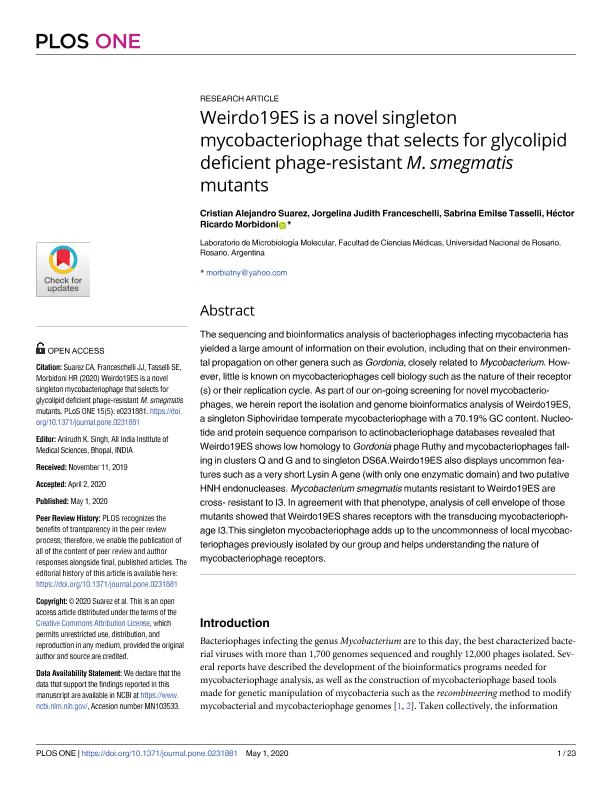Mostrar el registro sencillo del ítem
dc.contributor.author
Suárez, Cristian Alejandro

dc.contributor.author
Franceschelli, Jorgelina Judith

dc.contributor.author
Tasselli, Sabrina Emilse

dc.contributor.author
Morbidoni, Héctor Ricardo

dc.date.available
2022-03-29T02:21:32Z
dc.date.issued
2020-05
dc.identifier.citation
Suárez, Cristian Alejandro; Franceschelli, Jorgelina Judith; Tasselli, Sabrina Emilse; Morbidoni, Héctor Ricardo; Weirdo19ES is a novel singleton mycobacteriophage that selects for glycolipid deficient phage-resistant M. Smegmatis mutants; Public Library of Science; Plos One; 15; 5; 5-2020; 1-23
dc.identifier.issn
1932-6203
dc.identifier.uri
http://hdl.handle.net/11336/153980
dc.description.abstract
The sequencing and bioinformatics analysis of bacteriophages infecting mycobacteria has yielded a large amount of information on their evolution, including that on their environmental propagation on other genera such as Gordonia, closely related to Mycobacterium. However, little is known on mycobacteriophages cell biology such as the nature of their receptor (s) or their replication cycle. As part of our on-going screening for novel mycobacteriophages, we herein report the isolation and genome bioinformatics analysis of Weirdo19ES, a singleton Siphoviridae temperate mycobacteriophage with a 70.19% GC content. Nucleotide and protein sequence comparison to actinobacteriophage databases revealed that Weirdo19ES shows low homology to Gordonia phage Ruthy and mycobacteriophages falling in clusters Q and G and to singleton DS6A.Weirdo19ES also displays uncommon features such as a very short Lysin A gene (with only one enzymatic domain) and two putative HNH endonucleases. Mycobacterium smegmatis mutants resistant to Weirdo19ES are cross- resistant to I3. In agreement with that phenotype, analysis of cell envelope of those mutants showed that Weirdo19ES shares receptors with the transducing mycobacteriophage I3.This singleton mycobacteriophage adds up to the uncommonness of local mycobacteriophages previously isolated by our group and helps understanding the nature of mycobacteriophage receptors.
dc.format
application/pdf
dc.language.iso
eng
dc.publisher
Public Library of Science

dc.rights
info:eu-repo/semantics/openAccess
dc.rights.uri
https://creativecommons.org/licenses/by-nc-sa/2.5/ar/
dc.subject
MYCOBACTERIOPHAGE
dc.subject
BIOINFORMATICS
dc.subject
SINGLETON
dc.subject
MUTANTS
dc.subject.classification
Otros Tópicos Biológicos

dc.subject.classification
Ciencias Biológicas

dc.subject.classification
CIENCIAS NATURALES Y EXACTAS

dc.title
Weirdo19ES is a novel singleton mycobacteriophage that selects for glycolipid deficient phage-resistant M. Smegmatis mutants
dc.type
info:eu-repo/semantics/article
dc.type
info:ar-repo/semantics/artículo
dc.type
info:eu-repo/semantics/publishedVersion
dc.date.updated
2022-03-16T12:38:50Z
dc.identifier.eissn
1932-6203
dc.journal.volume
15
dc.journal.number
5
dc.journal.pagination
1-23
dc.journal.pais
Estados Unidos

dc.journal.ciudad
San Francisco
dc.description.fil
Fil: Suárez, Cristian Alejandro. Universidad Nacional de Rosario. Facultad de Ciencias Médicas. Laboratorio de Microbiología Molecular; Argentina. Consejo Nacional de Investigaciones Científicas y Técnicas. Centro Científico Tecnológico Conicet - Rosario; Argentina
dc.description.fil
Fil: Franceschelli, Jorgelina Judith. Universidad Nacional de Rosario. Facultad de Ciencias Médicas. Laboratorio de Microbiología Molecular; Argentina. Consejo Nacional de Investigaciones Científicas y Técnicas. Centro Científico Tecnológico Conicet - Rosario; Argentina
dc.description.fil
Fil: Tasselli, Sabrina Emilse. Universidad Nacional de Rosario. Facultad de Ciencias Médicas. Laboratorio de Microbiología Molecular; Argentina. Consejo Nacional de Investigaciones Científicas y Técnicas. Centro Científico Tecnológico Conicet - Rosario; Argentina
dc.description.fil
Fil: Morbidoni, Héctor Ricardo. Universidad Nacional de Rosario. Facultad de Ciencias Médicas. Laboratorio de Microbiología Molecular; Argentina
dc.journal.title
Plos One

dc.relation.alternativeid
info:eu-repo/semantics/altIdentifier/url/https://journals.plos.org/plosone/article?id=10.1371/journal.pone.0231881q
dc.relation.alternativeid
info:eu-repo/semantics/altIdentifier/doi/https://doi.org/10.1371/journal.pone.0231881
Archivos asociados
